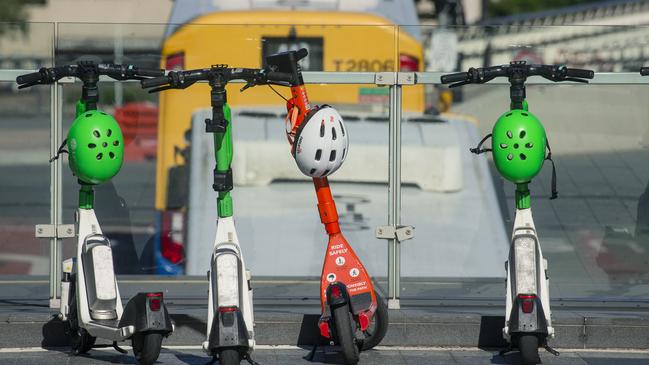Editorial: Study confirms e-scooters are dangerous to kids
Once again an academic study has proven what we knew all along – e-scooters are dangerous for kids, writes the editor.

Opinion
Don't miss out on the headlines from Opinion. Followed categories will be added to My News.
Once again an academic study has proven what we knew all along – e-scooters are dangerous for kids.
As health reporter Jackie Sinnerton reveals today, the first ever study into pediatric injuries sustained on the vehicles shows the true extent of the problem.
In just two years at Sunshine Coast University Hospital, 176 children presented for injuries caused by e-scooters – with 10 per cent of those potentially life-threatening.
Alarmingly, 42 per cent of those injured riders weren’t wearing a helmet. Remember, these figures are from just one hospital and the number of accidents is increasing every year.
Hire scooters in the CBD have their top speeds limited but privately-owned ones can hit 60km/h – well above the speed limits for kids of 25km/h on roads and 12km/h on footpaths.
The Queensland government is currently conducting a parliamentary inquiry into e-bike and e-scooter safety, and these figures will give it pause for thought.
There is of course, a simple way to tackle the issue – ban children under 16 from riding e-scooters, like they are in most Australian states, at least until safety measures are improved.
Regulation has failed to keep pace with the rise of e-scooters, and it is time to take action.
EMBRACE, DON’T FEAR, A.I.
Giving the union movement a say in limiting how workers should use artificial intelligence in their jobs is like trying to hold back a rising tide by building a wall of sand between the water and their members – they would eventually be swamped.
Instead of trying to set rules for AI engagement, unions should be demanding more from employers around training for and access to the new technology – and so reflect the best available current wisdom: That AI itself will not be taking your job, but someone who uses it better than you might well be doing so.
The concerns being raised by unions are understandable. This is new technology, and history shows that every new technological advancement stokes fears of widespread job losses.
It was the same with the rise of the internet in the 1990s, when unions warned of the potential for automation to make redundant a swath of traditional jobs.
Some roles did indeed disappear. But three decades on, not one of us is seriously complaining about the internet. That is because we have learned how to deploy it as a tool – and so it has made us better at our jobs. Can you imagine, for example, a single day at work without Google search? So it will come to pass with AI, which is not a replacement for human cognition but rather – like search – an add-on that will save time and challenge our thinking – essentially, what has been dubbed intelligence augmentation, or IA.
A good way of understanding this reality is that a key limitation of AI and large language models is that their functionality can only ever be based on data that already exists. Humans, on the other hand, add the use of judgment to make better decisions than AI ever could.
We are, as global AI leader Leon Gordon recently noted, “creative, innovative, logical and empathetic” – all things that robots are not. And he points out we knew this decades ago, and we were shown it in 1987, in Star Trek: The Next Generation – in the interactions between Captain Picard and his human-looking android AI sidekick called Data.
“It’s evident that Data can do things Picard cannot in terms of scanning enormous amounts of data to make elaborate predictions and forecasts,” Gordon recently wrote in Forbes.
“But Data’s toolkit has considerable holes. His weaknesses (namely, his lack of ability to think, feel, and judge like a human) are why Data remains in his role as a subordinate to Picard, the captain.”
Fast forward to today, and anybody who has spent any time using the now-rapidly emerging real-world AI in the workplace has found this truth to hold.
The technology is mind-blowing at summarising information that already exists, but it is seriously limited when it comes to complex decision making with all the nuances that human cognition adds. Hence the truth that AI will enhance your job, not take it.
The federal Minister with responsibility for AI regulation, Science and Industry Minister Tim Ayres, used a speech yesterday to suggest trade unions should have a role in setting rules for AI engagement in the workplace.
He said: “I will be looking in particular at how we can strengthen worker voice and agency as technology is diffused into every workplace in the Australian economy – and I look forward to working with our trade union movement on all of this”.
The concept of workers having a voice through their unions is one thing, and it is a valued part of our industrial system. But workers’ “agency” is actually up to them.
Making the most of that agency will, however, rely on bosses giving workers access to the technology – and, of course, the training required to help them properly understand these world-altering new tools will make them better at their jobs.
Responsibility for election comment is taken by Chris Jones, corner of Mayne Rd & Campbell St, Bowen Hills, Qld 4006. Printed and published by NEWSQUEENSLAND (ACN 009 661 778). Contact details here



